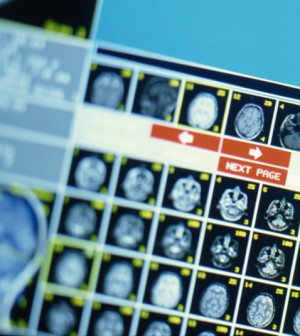- 8 Ways to Increase Dopamine Naturally
- 7 Best Breads for Maintaining Stable Blood Sugar
- Gelatin vs. Collagen: Which is Best for Skin, Nails, and Joints?
- The Long-Term Effects of Daily Turmeric Supplements on Liver Health
- Could Your Grocery Store Meat Be Causing Recurring UTIs?
- Are You Making This Expensive Thermostat Error This Winter?
- Recognizing the Signs of Hypothyroidism
- 10 Strategies to Overcome Insomnia
- Could Artificial Sweeteners Be Aging the Brain Faster?
- Techniques for Soothing Your Nervous System
Health Highlights: Dec. 9, 2013


Here are some of the latest health and medical news developments, compiled by the editors of HealthDay:
Eastern Governors Want Tighter Air Pollution Rules in Midwest States
The governors of eight Eastern states want the Environmental Protection Agency to impose stricter air pollution standards on nine Appalachian and Rust Belt states.
For more than 15 years, New York and other East Coast states have had tighter air pollution controls than many other areas of the country, and their governors have long criticized Midwest states for having weaker regulations while winds carry their coal burning air pollution to other states, The New York Times reported.
The petition was to be presented to the EPA on Monday, the day before the Supreme Court is set to hear arguments in a case involving a related EPA regulation that’s known as the “good neighbor rule” but is officially called the Cross-State Air Pollution Rule.
The regulation would require states that create coal burning air pollution that travels to other states to reduce emissions either by installing pollution control technology or by closing the plants, The Times reported.
Even if the Supreme Court upholds the law against the legal challenge, the Eastern governors still want the EPA to impose tighter controls on air pollution on the Appalachian and Rust Belt states.
—–
Men Thought to be Cured of HIV Have Traces of the Virus
Two Boston men previously believed to have been cured of HIV now have traces of the AIDS-causing virus in their blood, researchers say.
The two patients made headlines in July when doctors announced they no longer had any detectable traces of HIV in their body. The men had received stem cell transplants after being diagnosed with the blood cancer Hodgkin’s lymphoma, and doctors believed the transplants had enabled the men’s bodies to eliminate HIV, CBS News reported.
At the time of the announcement that the men were HIV-free, they had not been taking antiretroviral medications for 15 weeks and seven weeks, respectively.
The discovery that the men now have traces of HIV in their blood, which was announced at an international conference on AIDS research in Florida, indicates that the virus can hide in places in the body where it is difficult to detect.
“This suggests that we need to look deeper, or we need to be looking in other tissues . . . the liver, gut, and brain,” said Dr. Timothy Henrich, associate professor of infectious diseases at Brigham and Women’s Hospital in Boston, CBS News reported.
“These are all potential sources, but it’s very difficult to obtain tissue from these places so we don’t do that routinely,” he explained.
Despite the reemergence of HIV in the two men, their cases provide insight that may help efforts to develop new treatments.
“We go back to the drawing board,” Henrich said. “It’s exciting science, even if it’s not the outcome we would have liked.”
Traces of HIV were found in the blood of another man who claimed to have been cured of HIV after receiving a stem cell transplant, but the man claims the viruses are dead and can’t replicate, CBS News reported.
A Mississippi baby born with HIV was also determined to be cured of HIV after being given a powerful three-drug infusion within 30 hours after birth. In October, researchers said the baby still appears to be HIV-free.
Copyright © 2026 HealthDay. All rights reserved.










